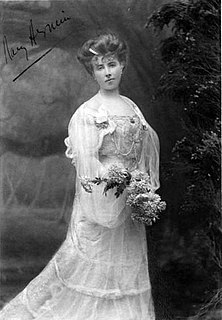A Quote by Friedrich Schiller
Man is made of the wholly common, and custom is his nurse; woe then to them who lay irreverent hands on his old house-furniture, the dear inheritance from his forefathers: For time consecrates, and what is gray with age becomes religion.
Related Quotes
When anyone is going wrong, it is a mistake to warn him not to go further. It is also a mistake to leave him alone. The proper course is to call his attention to something better, and frame our conversation in such a way that he becomes wholly absorbed in the better. He will then forget his old mistakes, his old faults and his old desires, and will give all his life and power to the building of that better which has engaged his new interest.
A man's character is like his house. If he tears boards off his house and burns them to keep himself warm and comfortable, his house soon becomes a ruin. If he tells lies to be able to do the things he shouldn't do but wants to, his character will soon become a ruin. A man with a ruined character is a shame on the face of the earth.
And in vain does the dreamer rummage about in his old dreams, raking them over as though they were a heap of cinders, looking into these cinders for some spark, however tiny, to fan it into a flame so as to warm his chilled blood by it and revive in it all that he held so dear before, all that touched his heart, that made his blood course through his veins, that drew tears from his eyes, and that so splendidly deceived him!
Dear God, I prayed, all unafraid (as we're inclined to do), I do not need a handsome man but let him be like You; I do not need one big and strong nor yet so very tall, nor need he be some genius, or wealthy, Lord, at all; but let his head be high, dear God, and let his eye be clear, his shoulders straight, whate'er his state, whate'er his earthly sphere; and let his face have character, a ruggedness if soul, and let his whole life show, dear God, a singleness of goal; then when he comes (as he will come) with quiet eyes aglow, I'll understand that he's the man I prayed for long ago.
And old Dave, he'd go up to his room, y'understand, put on his green velvet slippers - I'll never forget - and pick up his phone and call the buyers, and without leaving his room, at the age of eighty-four, he made his living. And when I saw that, I realized that selling was the greatest career a man could want.
[Man] is the only animal who lives outside of himself, whose drive is in external things—property, houses, money, concepts of power. He lives in his cities and his factories, in his business and job and art. But having projected himself into these external complexities, he is them. His house, his automobile are a part of him and a large part of him. This is beautifully demonstrated by a thing doctors know—that when a man loses his possessions a very common result is sexual impotence.



































